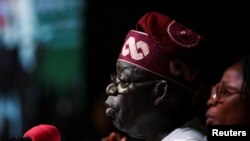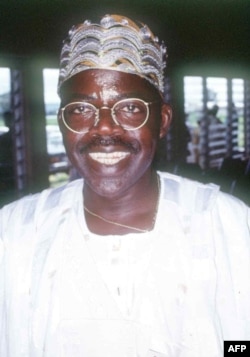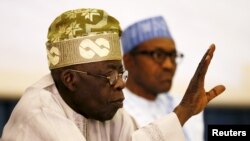Amid calls to reject the presidential win from Nigeria’s main opposition, Tinubu said he welcomes the results.
"I am very happy I have been elected the president of the Federal Republic of Nigeria; this is a serious mandate. I hereby accept it," Tinubu said during his victory speech Wednesday.
Tinubu was born in Lagos in 1952 to a Muslim family and belongs to the Yoruba ethnic group, which makes up 16% of the country's population.
For much of his career, Tinubu was a political player behind the scenes and gained the nickname "godfather" for his past patronage network backing candidates to office.
He started his early education in Lagos and the southwest city of Ibadan and later moved to the United States in the 1970s, where he held several jobs including as a dishwasher, taxi driver and night guard as he continued his education. He graduated from Chicago State University in 1979 with a degree in business administration.
He returned to Nigeria 1980s and began work for an oil company as an auditor.
In 1993, when a military government annulled the then-election results, Tinubu became a founding member of a pro-democracy movement, the National Democratic Coalition, or NADECO, a year later after returning from exile. The group advocated and mobilized support for a return to democracy.
"I’ve spent over four years in exile campaigning for democracy. I’ve returned to the country to participate in the transition program because I believe in the credibility of the election and the transition program itself and have actively participated since my return. The local government election went well, the logistics were inadequate, but effectively we have mastered some of the weaknesses and then will proceed," Tinubu said during a speech before the 1999 presidential and legislative elections that ended 15 years of military rule in Nigeria.
Tinubu was then elected as the governor of Lagos and served two terms, bowing out of political contention in 2007.
Experts say his support helped outgoing leader Muhammadu Buhari win two terms in office.
At 70, critics say his age and health may be a disadvantage. During campaigns, Tinubu missed several of his party’s big events with questions raised about his frail appearance. He has, however, repeatedly brushed aside concerns about his health.
As he now prepares to take over his position from Buhari, the president-elect faces enormous challenges ahead, including security and an ailing economy.
This report originates from VOA's Hausa service. VOA's Haruna Shehu and Salem Solomon contributed.








